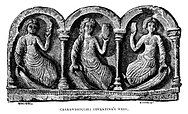
Back Ierse mitologie Afrikaans Mitolochía irlandesa AN أساطير أيرلندية Arabic Gwengelouriezh Iwerzhon Breton Mitologia irlandesa Catalan Irská mytologie Czech Chwedloniaeth Iwerddon Welsh Irische Mythologie German Ιρλανδική μυθολογία Greek Irlanda mitologio Esperanto
This article has multiple issues. Please help improve it or discuss these issues on the talk page. (Learn how and when to remove these template messages)
|


| Part of a series on |
| Celtic mythologies |
|---|
 |
Irish mythology is the body of myths indigenous to the island of Ireland. It was originally passed down orally in the prehistoric era. In the early medieval era, some myths were transcribed by Christian monks, who heavily altered and Christianised the myths. Irish mythology is the best-preserved branch of Celtic mythology.
The myths are conventionally grouped into 'cycles'. The Mythological Cycle consists of tales and poems about the god-like Túatha Dé Danann, who are based on Ireland's pagan deities, and other mythical races like the Fomorians.[1] Important works in the cycle are the Lebor Gabála Érenn ("Book of Invasions"), a legendary history of Ireland, the Cath Maige Tuired ("Battle of Moytura"), and the Aided Chlainne Lir ("Children of Lir"). The Ulster Cycle consists of heroic legends relating to the Ulaid, the most important of which is the epic Táin Bó Cúailnge ("Cattle Raid of Cooley").[2] The Fianna Cycle focuses on the exploits of the mythical hero Finn and his warrior band the Fianna, including the lengthy Acallam na Senórach ("Tales of the Elders"). The Kings' Cycle comprises legends about historical and semi-historical kings of Ireland (such as Buile Shuibhne, "The Madness of King Sweeny"), and tales about the origins of dynasties and peoples.[2]
There are also mythical texts that do not fit into any of the cycles; these include the echtrai tales of journeys to the Otherworld (such as The Voyage of Bran), and the Dindsenchas ("lore of places"). Some written material has not survived, and many more myths were probably never written down.
- ^ Koch, John (2006). Celtic Culture: A Historical Encyclopedia. ABC-CLIO. p. 1326.
- ^ a b Koch, John (2006). Celtic Culture: A Historical Encyclopedia. ABC-CLIO. p. 995.
© MMXXIII Rich X Search. We shall prevail. All rights reserved. Rich X Search